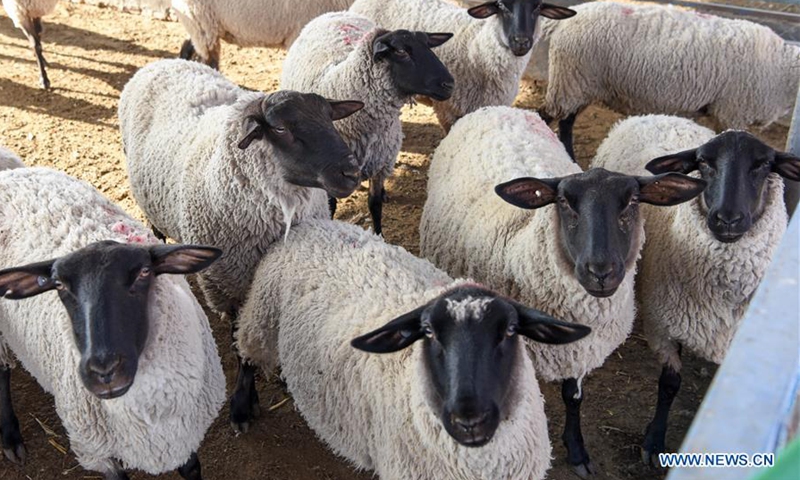Australian mutton exports to China hit hard by pandemic
By GT staff reporters Source: Global Times Published: 2020/12/14 20:53:40
Australian mutton sales to China down 90%

Photo taken on Oct. 19, 2020 shows a herd of Suffolk sheep at an animal husbandry company in Manas County, northwest China's Xinjiang Uygur Autonomous Region. (Xinhua/Ding Lei)
Australia's mutton export to China has edged down amid the global pandemic and a worsening bilateral relationship with China, with industry observers urging Canberra to take concrete actions to shore up the relationship as Australian brands are being abandoned by Chinese consumers.A manager of an animal meat importing business based in Yantai, East China's Shandong Province, who preferred to be anonymous told the Global Times on Monday that the company's imports of lamb from Australia and New Zealand had plunged about 90 percent in recent months, due to a resurgence in COVID-19 infections in China that were largely linked to contaminated frozen foot imports.
The company started to buy mutton from Australia in 2016, with an import volume of dozens of tons each year.
"Due to the lower price of Australian mutton compared with that produced domestically, sales of Australian meat have grown each year," the manager said.
China has been the largest importer of Australia's lamb by volume since 2012, accounting for about 24 percent of its total exports. But data showed that Australia's total sheep meat exports dropped 24 year-on-year in November, local media reports said.
By contrast, sales of domestic lamb are up 108 percent year-on-year since the beginning of 2020, and its share of all animal meat consumed in China has also grown significantly, according to data released by Alibaba-backed Tmall.
Wang Hailong, a lamb trader in North China's Inner Mongolia Autonomous Region, told the Global Times that along with the consumption rebound in the wake of the COVID-19 outbreak, domestic demand for mutton has been increasing.
Demand usually peaks near Chinese holidays such as the Spring Festival holiday. "As I hear from my customers, the taste of Inner Mongolian mutton is better than imported mutton and it's also cheaper," said Wang.
A mutton importer based in Guangzhou, South China's Guangdong Province, told the Global Times that his company had stopped buying Australian mutton in November.
"The pandemic overseas is so severe that consumers show concern about the safety of imported frozen meat and they have stopped buying it," he said. The company is shifting to domestic mutton.
The Daily Mail reported last week that Chinese customs had banned lamb imports from two Australian companies - JBS Brooklyn and the Australian Lamb Co - for four months after they briefly shut down amid the COVID-19 outbreak.
Jiao Shanwei, editor-in-chief of cngrain.com, a website specializing in grain news, told the Global Times on Monday that aside from mutton, the country's imports of Australian barley and other agricultural products have fallen sharply this year, mainly due to cooling bilateral trade.
"In the short term, imports of Australian agricultural products and ore will likely continue to drop," he said.
Wang Shiming, a professor with the School of Advanced International and Area Studies of East China Normal University, stressed that China will not start a trade war with Australia. "Given Australia's wide gap with China, why would we need to launch a trade war?" he said.
He said that the restoration of the China-Australia relationship depends on the Australian side, which he said should stop its attacks on Chinese people and discriminatory actions against China and Chinese companies.
"Nothing imported from Australia is irreplaceable," Wang said, noting that Chinese consumers may abandon more Australian brands that they previously liked if Australia becomes increasingly anti-China.
Newspaper headline: Pandemic, friction take toll
Posted in: ECONOMY